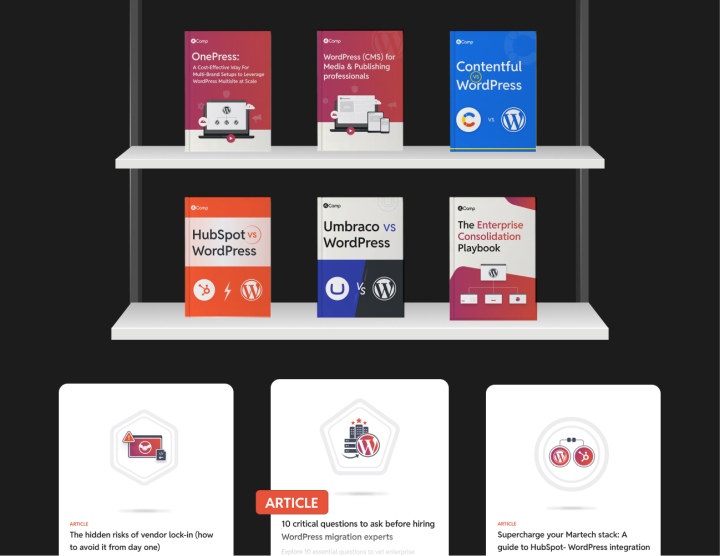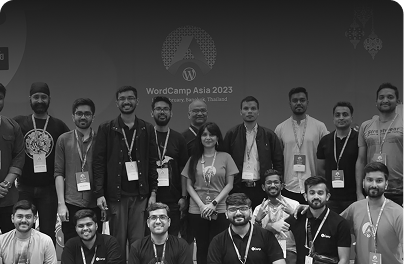Umbraco to WordPress migration services
Simplify your CMS. Cut costs. Migrate from Umbraco to WordPress without losing your content, design, or SEO visibility. Future-ready from day one.
Why move fromUmbraco to WordPress?
Umbraco gives developers control, but with time, that control can become complex. WordPress offers a more scalable, intuitive, and cost-effective way to manage digital experiences, without sacrificing flexibility.
Lower Total Cost of Ownership (TCO)
Running a site on Umbraco often means higher development effort, custom maintenance, and complex hosting. WordPress brings those costs down, with no license fees, flexible hosting options, and an ecosystem of plugins and tools that reduce the need for custom builds.
Modern editorial workflows
Teams often struggle with Umbraco’s content workflows and structure. WordPress provides a block-based, intuitive editorial interface, making campaign management and content updates faster across teams.
Backward-compatible upgrade
Upgrading between major Umbraco versions can feel like starting over, often requiring redevelopment of features and templates. WordPress is built with backward compatibility in mind, allowing version updates without breaking features, saving time and budget.
Centralized multisite management at scale
Managing multiple sites in Umbraco can become complex quickly. With WordPress Multisite, enterprises can centrally manage themes, users, workflows, and governance across dozens or hundreds of sites from a single dashboard.
Built-in integrations
Connecting Umbraco to tools like Salesforce or HubSpot usually requires .NET developers. WordPress offers ready-made plugins and REST APIs, making CRM, analytics, and marketing integrations faster and cheaper.
Grows with Your Business
Whether you’re launching more sites, expanding into new regions, or adopting a headless setup, WordPress adapts. Its flexibility and community support make it easier to keep up with your business goals, without needing to replatform again later.
Get up to 20 hours of (free) scoping for your corporate website
Let’s align your corporate website with your business goals. We’ll dive into your needs and challenges, offering strategic insights to help you move forward with confidence.
Umbraco to WordPress:
rtCamp’s migration approach
Here’s how we handle Umbraco to WordPress migrations at rtCamp.
Analyzing your Umbraco setup
Conduct a detailed review of features, workflows, and integrations. Map these to equivalent WordPress solutions.
Frontend migration
Recreate your Umbraco design as a custom WordPress theme. Optionally, redesign for enhanced user experience and modern branding.
Backend transition
Replace Umbraco-specific workflows with WordPress plugins or custom developments. Rebuild forms, integrations, and functionalities.
Content migration
Migrate pages, posts, media, and metadata while preserving internal linking. Leverage automated and manual methods for precision and consistency.
SEO migration
Safeguard your SEO equity by replicating metadata, URLs, and structured data. Implement 301 redirects to retain search rankings.
Trust and confidence
built through a track record of success
15+
years of enterprise IT experience
200+
rtCampers for any scale & scope
300+
successful WordPress migrations
20 hours of free discovery: Get clarity on the scope and complexity of your project
Ready to make the move fromUmbraco to WordPress? Explore our process
Keep it simple and hassle-free with rtCamp’s expert-led Umbraco to WordPress migration service.
Navigating the Umbraco to WordPress shift?
Check out these resources
Umbraco to WordPress migration guide
Plan and execute your Umbraco to WordPress migration with confidence. This step-by-step guide covers everything from technical planning and content mapping to launch and post-migration optimization, so you can migrate without disruption.
Umbraco vs WordPress handbook
Compare Umbraco and WordPress across cost of ownership, editorial usability, multisite management, and long-term maintainability. This guide breaks down where each platform stands, so you can make an informed, future-ready decision.
Umbraco to WordPress migration FAQs
Get answers to some of the most frequently asked questions about migrating from Umbraco to WordPress!
Many businesses outgrow Umbraco due to its reliance on developer-led workflows, expensive upgrade cycles, and limited multisite management. WordPress removes these bottlenecks with flexible publishing, easier integrations, and a more maintainable architecture, without compromising scale or security.
Not at all. We map all existing Umbraco features, including custom components and third-party integrations, and rebuild them in WordPress using native APIs, plugins, or custom code. In many cases, you’ll gain more flexibility and extendability than before.
We conduct a complete SEO audit before migration. This includes replicating metadata, canonical tags, and structured data. We also maintain existing URLs or set up 301 redirects, and run SEO testing pre- and post-launch to preserve your search performance.
Most enterprise migrations take 8–12 weeks, depending on complexity. We handle the heavy lifting, your team mainly participates in discovery, content reviews, and final validation. A detailed timeline and team plan are shared during the planning phase.
Yes. While we can mirror your existing design, many clients use migration as a chance to refresh their UX, accessibility, or brand identity. We support both design-preserving and redesign tracks, depending on your goals.












